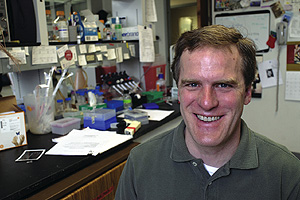Matthew Brady, Assistant Professor in Medicine
By Suzanne WilderMedical Center Communications
 Matthew Brady (Photo by Beth Rooney) | |
Matthew Brady has been on both sides of the classroom at the University. As an undergraduate and graduate student, he scribbled notes in classes and worked in the laboratories of Abbott Memorial Hall. Now, he stands in front of undergraduates delivering lectures on the endocrine system and cell signaling.
“It’s one of the coolest things, being back here,” Brady said, “being on the other side of the podium.”
An Assistant Professor of Endocrinology and Diabetes & Metabolism in Medicine, Brady teaches a series of classes on endocrinology to mostly third- and fourth-year undergraduates. Those classes led to his nomination for this year’s Quantrell Award.
The New York City native graduated with a bachelor’s degree in biological sciences from the University in 1987. He worked in a pharmacology and physiology lab during his junior year, which inspired his graduate work in neurobiology.
After Brady earned a Ph.D. in pharmacological and physiological sciences at the University in 1994, he moved to Ann Arbor, Mich., where he worked at Parke Davis, a pharmaceutical company. His job as a researcher introduced him to his career passion: insulin, diabetes and metabolism research. He spent six years there conducting research, presenting findings and publishing papers.
“It was such a great environment,” Brady said, but his research area was eliminated in the company’s merger with Pfizer in 2000. Brady then returned to the University’s campus, but this time as an Assistant Professor in Medicine.
He now teaches endocrinology to undergraduate students. His fall class focuses on cell signaling, in winter he teaches the endocrine system and organ physiology, and in spring he focuses on what can go wrong with the system. Part of the joy Brady finds in teaching is explaining topics that fascinate him. But through the series—which he considers a “mega-class”—“We try to keep an eye on the big picture at all times,” he said.
“You don’t want the students to lose the forest for the leaves,” Brady said, referring to the detail in some of the classes. Though students can choose to take just one or two classes in the endocrinology series, “Obviously,” he said, “I think people get more out of it if they take all three.”
Brady loves the integration between undergraduates, graduate students and the Medical Center at Chicago, he said, and that he gets to interact with younger and older students.
“I got some great advice when I started out here,” he said. He knew he had to focus on getting funding and publishing papers, like other professors. But Brady also realized the importance of being proactive and embracing his own passions.
“You’re going to have to do other things,” he heard from a more experienced faculty member. Brady chose to join the committees he is on and jumped at the chance to teach classes in which he has a strong interest.
As a member of three committees—Molecular Metabolism and Nutrition, Cell Physiology and Molecular Pathogenesis and Molecular Medicine—he has the opportunity to teach and conduct research with graduate students who work in those fields.
“This award means an awful lot to me,” he said, adding that it is a way to understand that the students are truly learning, not just worrying about grades.
“I think the undergraduates here are exceptional,” he said, though he admits that as an alumnus, he is biased.
![[Chronicle]](/images/sidebar_header_oct06.gif)